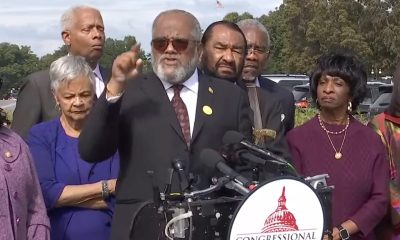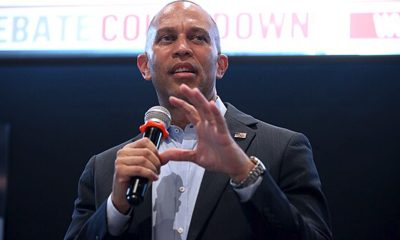National
Supreme Court Extends Gay Marriage Nationwide

The crowd reacts as the ruling on same-sex marriage was announced outside of the Supreme Court in Washington, Friday June 26, 2015. The Supreme Court declared Friday that same-sex couples have a right to marry anywhere in the US. (AP Photo/Jacquelyn Martin)
MARK SHERMAN, Associated Press
WASHINGTON (AP) — The Supreme Court declared Friday that same-sex couples have a right to marry anywhere in the United States, a historic culmination of decades of litigation over gay marriage and gay rights generally.
Gay and lesbian couples already could marry in 36 states and the District of Columbia. The court’s 5-4 ruling means the remaining 14 states, in the South and Midwest, will have to stop enforcing their bans on same-sex marriage.
A court in Atlanta issued marriage licenses to three same-sex couples Friday morning, soon after the decision.
Gay rights supporters cheered, danced and wept outside the court after the decision, which put an exclamation point on breathtaking changes in the nation’s social norms.
Justice Anthony Kennedy wrote the majority opinion, just as he did in the court’s previous three major gay rights cases dating back to 1996. It came on the anniversary of two of those earlier decisions.
“No union is more profound than marriage,” Kennedy wrote, joined by the court’s four more liberal justices.
The stories of the people asking for the right to marry “reveal that they seek not to denigrate marriage but rather to live their lives, or honor their spouses’ memory, joined by its bond,” Kennedy said.
As he read his opinion, spectators in the courtroom wiped away tears after the import of the decision became clear. One of those in the audience was James Obergefell, the lead plaintiff in the Supreme Court fight.
Outside, Obergefell held up a photo of his late spouse, John, and said the ruling establishes that “our love is equal.” He added, “This is for you, John.”
President Barack Obama placed a congratulatory phone call to Obergefell, which he took amid a throng of reporters outside the courthouse.
Speaking a few minutes later at the White House, Obama praised the decision as “justice that arrives like a thunderbolt.” He said it was an affirmation of the principle that “all Americans are created equal.”
The four dissenting justices each filed a separate opinion explaining his views, but they all agreed that states and their voters should have been left with the power to decide who can marry.
“This court is not a legislature. Whether same-sex marriage is a good idea should be of no concern to us,” Chief Justice John Roberts wrote in dissent. Roberts read a summary of his dissent from the bench, the first time he has done so in nearly 10 years as chief justice.
“If you are among the many Americans — of whatever sexual orientation — who favor expanding same-sex marriage, by all means celebrate today’s decision,” Roberts said. “But do not celebrate the Constitution. It had nothing to do with it.”
Justice Antonin Scalia said he was not concerned so much about same-sex marriage but about “this court’s threat to American democracy.” Justices Samuel Alito and Clarence Thomas also dissented.
Several religious organizations criticized the decision and a group of pastors in Texas vowed to defy it.
Kennedy said nothing in the court’s ruling would force religions to condone, much less perform, weddings to which they object.
The ruling will not take effect immediately because the court gives the losing side roughly three weeks to ask for reconsideration. But some state officials and county clerks might follow the lead of the Fulton County, Georgia, probate court and decide there is little risk in issuing marriage licenses to same-sex couples.
The cases before the court involved laws from Kentucky, Michigan, Ohio and Tennessee that define marriage as the union of a man and a woman. Those states have not allowed same-sex couples to marry within their borders and they also have refused to recognize valid marriages from elsewhere.
Just two years ago, the Supreme Court struck down part of the federal anti-gay marriage law that denied a range of government benefits to legally married same-sex couples.
Justices Stephen Breyer, Ruth Bader Ginsburg, Elena Kagan and Sonia Sotomayor formed the majority with Kennedy on Friday, the same lineup as two years ago.
The earlier decision in United States v. Windsor did not address the validity of state marriage bans, but courts across the country, with few exceptions, said its logic compelled them to invalidate state laws that prohibited gay and lesbian couples from marrying.
The number of states allowing same-sex marriage has grown rapidly. As recently as last October, just over one-third of the states permitted it.
There are an estimated 390,000 married same-sex couples in the United States, according to UCLA’s Williams Institute, which tracks the demographics of gay and lesbian Americans. Another 70,000 couples living in states that do not currently permit them to wed would get married in the next three years, the institute says. Roughly 1 million same-sex couples, married and unmarried, live together in the United States, the institute says.
The Obama administration backed the right of same-sex couples to marry. The Justice Department’s decision to stop defending the federal anti-marriage law in 2011 was an important moment for gay rights, and Obama declared his support for same-sex marriage in 2012.
The states affected by Friday’s ruling are: Alabama, Arkansas, Georgia, Kentucky, Louisiana, Michigan, Mississippi, most of Missouri, Nebraska, North Dakota, Ohio, South Dakota, Tennessee and Texas.
___
Associated Press writers Jessica Gresko, Sam Hananel and Glynn Hill contributed to this report.
Copyright 2015 The Associated Press. All rights reserved. This material may not be published, broadcast, rewritten or redistributed.
Activism
Oakland Post: Week of December 31, 2025 – January 6, 2026
The printed Weekly Edition of the Oakland Post: Week of – December 31, 2025 – January 6, 2026

To enlarge your view of this issue, use the slider, magnifying glass icon or full page icon in the lower right corner of the browser window.
Activism
2025 in Review: Seven Questions for Assemblymember Lori Wilson — Advocate for Equity, the Environment, and More
Her rise has also included several historic firsts: she is the only Black woman ever appointed to lead the influential Assembly Transportation Committee, and the first freshman legislator elected Chair of the California Legislative Black Caucus. She has also been a vocal advocate for vulnerable communities, becoming the first California legislator to publicly discuss being the parent of a transgender child — an act of visibility that has helped advanced representation at a time when political tensions related to social issues and culture have intensified.

By Edward Henderson, California Black Media
Assemblymember Lori D. Wilson (D-Suisun City) joined the California Legislature in 2022 after making history as Solano County’s first Black female mayor, bringing with her a track record of fiscal discipline, community investment, and inclusive leadership.
She represents the state’s 11th Assembly District, which spans Solano County and portions of Contra Costa and Sacramento Counties.
Her rise has also included several historic firsts: she is the only Black woman ever appointed to lead the influential Assembly Transportation Committee, and the first freshman legislator elected Chair of the California Legislative Black Caucus. She has also been a vocal advocate for vulnerable communities, becoming the first California legislator to publicly discuss being the parent of a transgender child — an act of visibility that has helped advanced representation at a time when political tensions related to social issues and culture have intensified.
California Black Media spoke with Wilson about her successes and disappointments this year and her outlook for 2026.
What stands out as your most important achievement this year?
Getting SB 237 passed in the Assembly. I had the opportunity to co-lead a diverse workgroup of colleagues, spanning a wide range of ideological perspectives on environmental issues.
How did your leadership contribute to improving the lives of Black Californians this year?
The Black Caucus concentrated on the Road to Repair package and prioritized passing a crucial bill that remained incomplete during my time as chair, which establishes a process for identifying descendants of enslaved people for benefit eligibility.
What frustrated you the most this year?
The lack of progress made on getting Prop 4 funds allocated to socially disadvantaged farmers. This delay has real consequences. These farmers have been waiting for essential support that was promised. Watching the process stall, despite the clear need and clear intent of the voters, has been deeply frustrating and reinforces how much work remains to make our systems more responsive and equitable.
What inspired you the most this year?
The resilience of Californians persists despite the unprecedented attacks from the federal government. Watching people stay engaged, hopeful, and determined reminded me why this work matters and why we must continue to protect the rights of every community in our state.
What is one lesson you learned this year that will inform your decision-making next year?
As a legislator, I have the authority to demand answers to my questions — and accept nothing less. That clarity has strengthened my approach to oversight and accountability.
In one word, what is the biggest challenge Black Californians are facing currently?
Affordability and access to quality educational opportunities.
What is the goal you want to achieve most in 2026?
Advance my legislative agenda despite a complex budget environment. The needs across our communities are real, and even in a tight fiscal year, I’m committed to moving forward policies that strengthen safety, expand opportunity, and improve quality of life for the people I represent.
Activism
2025 in Review: Seven Questions for Assemblymember Tina McKinnor, Champion of Reparations, Housing and Workers’ Rights
In 2025, McKinnor pushed forward legislation on renters’ protections, re-entry programs, reparations legislation, and efforts to support Inglewood Unified School District. She spoke with California Black Media about the past year and her work. Here are her responses.

By Joe W. Bowers Jr., California Black Media
Assemblymember Tina McKinnor (D-Inglewood) represents
California’s 61st Assembly District.
As a member of the California Legislative Black Caucus (CLBC),
McKinnor was elected in 2022. She chairs the Los Angeles County Legislative Delegation and leads the Assembly Public Employment and Retirement Committee. McKinnor also served as a civic engagement director, managed political campaigns, and worked as chief of staff for former Assemblymembers Steven Bradford and Autumn Burke.
In 2025, McKinnor pushed forward legislation on renters’ protections, re-entry programs, reparations legislation, and efforts to support Inglewood Unified School District. She spoke with California Black Media about the past year and her work. Here are her responses.
Looking back on 2025, what do you see as your biggest win?
Assembly Bill (AB) 628. If rent is $3,000, people should at least have a stove and a refrigerator. It’s ridiculous that people were renting without basic appliances.
I’m also proud that I was able to secure $8.4 million in the state budget for people coming home from incarceration. That includes the Homecoming Project, the menopause program for incarcerated women, and the Justice Leaders Program.
How did your leadership help make life better for Black Californians this year?
After the Eaton Fire, I pushed to get the same kind of support for affected areas that wealthier regions get after disasters.
I also did a lot of work building political power— establishing the Black Legacy PAC and California for All of Us PAC so we could support Black candidates and educate voters. We also called voters to make sure they understood Prop 50.
People need to understand this: there are only 12 Black legislators in the Capitol. Folks act like we can just walk in and pass reparations, but that’s not how it works.
What frustrated you most this year?
The governor did not have the political will to sign these bills: AB 57 and AB 62. They both passed overwhelmingly in the Assembly and the Senate. We did the work. The only person who didn’t have the political will to sign them was the governor.
The public needs to ask the governor why he didn’t sign the bills. We can’t keep letting people off the hook. He has to answer.
I also introduced AB 51 — the bill to eliminate interest payments on Inglewood Unified School District’s long-standing state loan — held in the Appropriations Committee. That was frustrating,
What inspired you most in 2025?
The civil rights trip to Alabama was life changing. We visited the Legacy Museum and the National Memorial for Peace and Justice. We took members of the Black, Latino, Jewish, and API caucuses with us. It changed all of us.
People aren’t always against us — they just don’t know our history.
What’s one lesson from 2025 that will shape how you approach decisions next year?
The legislative trip to Norway taught me that collaboration matters. Government, labor, and industry sit down together there. They don’t make villains. Everybody doesn’t get everything they want, but they solve problems.
What’s the biggest challenge facing Black Californians in one word?
Inequity. It shows up in housing, wealth, stress – all these things.
What’s the number one goal you want to accomplish in 2026?
Bringing back AB 57 and AB 62, and securing money for the Inglewood Unified loan interest forgiveness.
-

 Bay Area4 weeks ago
Bay Area4 weeks agoPost Salon to Discuss Proposal to Bring Costco to Oakland Community meeting to be held at City Hall, Thursday, Dec. 18
-

 Activism4 weeks ago
Activism4 weeks agoMayor Lee, City Leaders Announce $334 Million Bond Sale for Affordable Housing, Roads, Park Renovations, Libraries and Senior Centers
-

 Activism4 weeks ago
Activism4 weeks agoOakland Post: Week of December 10 – 16, 2025
-

 Activism4 weeks ago
Activism4 weeks agoOakland School Board Grapples with Potential $100 Million Shortfall Next Year
-

 Arts and Culture4 weeks ago
Arts and Culture4 weeks agoFayeth Gardens Holds 3rd Annual Kwanzaa Celebration at Hayward City Hall on Dec. 28
-

 Activism4 weeks ago
Activism4 weeks ago2025 in Review: Seven Questions for Black Women’s Think Tank Founder Kellie Todd Griffin
-

 Advice4 weeks ago
Advice4 weeks agoCOMMENTARY: If You Don’t Want Your ‘Black Card’ Revoked, Watch What You Bring to Holiday Dinners
-

 Activism4 weeks ago
Activism4 weeks agoAnn Lowe: The Quiet Genius of American Couture


















































